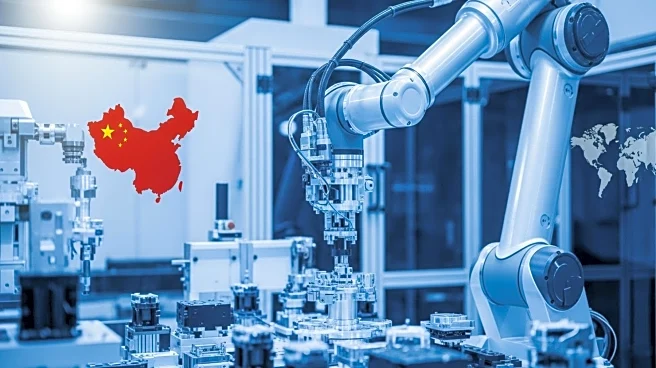What's Happening?
China's manufacturing sector is increasingly recognized as a global leader in innovation and production capabilities. At the IFA Berlin 2025, a major consumer electronics trade fair, Chinese companies made a significant impact, with over 690 firms participating. This presence underscores China's role in driving trends in artificial intelligence, sustainability, and digital transformation. Minister of Industry and Information Technology Li Lecheng highlighted China's achievements in aerospace, pharmaceuticals, and robotics, showcasing the nation's shift from following to leading in global innovation. Notable advancements include the development of Brukinsa, a cancer treatment drug approved in 75 markets, including the U.S. This progress is supported by China's comprehensive industrial supply chains, a robust engineering talent pool, and substantial investment in research and development.
Why It's Important?
China's advancements in manufacturing and innovation have significant implications for U.S. industries and global supply chains. As China transitions from being the 'world's factory' to a global supply chain hub, U.S. companies may face increased competition in technology and manufacturing sectors. The presence of Chinese firms at international trade fairs highlights their growing influence and potential partnerships that could reshape global market dynamics. Additionally, China's investment in R&D and its ability to produce advanced technologies may challenge U.S. leadership in these areas, prompting American companies to innovate and adapt to maintain competitiveness.
What's Next?
The continued expansion of China's manufacturing capabilities and its role in global supply chains may lead to increased collaboration between Chinese and U.S. firms. As China seeks to enhance the resilience and stability of industrial and supply chains, U.S. companies might explore partnerships to leverage China's technological advancements. This could result in joint ventures and cooperative efforts in areas like robotics and pharmaceuticals. Furthermore, the evolving global trade landscape may prompt U.S. policymakers to reassess trade strategies and regulations to address the growing influence of Chinese manufacturing.
Beyond the Headlines
China's rise as a manufacturing and innovation leader raises ethical and strategic considerations for U.S. industries. The shift in global supply chains may lead to discussions on intellectual property rights, technology transfer, and the balance of trade. Additionally, the integration of advanced technologies like brain-computer interfaces into various sectors poses questions about privacy, data security, and the societal impact of such innovations. As China continues to expand its influence, U.S. stakeholders must navigate these complexities to ensure sustainable and equitable growth.











